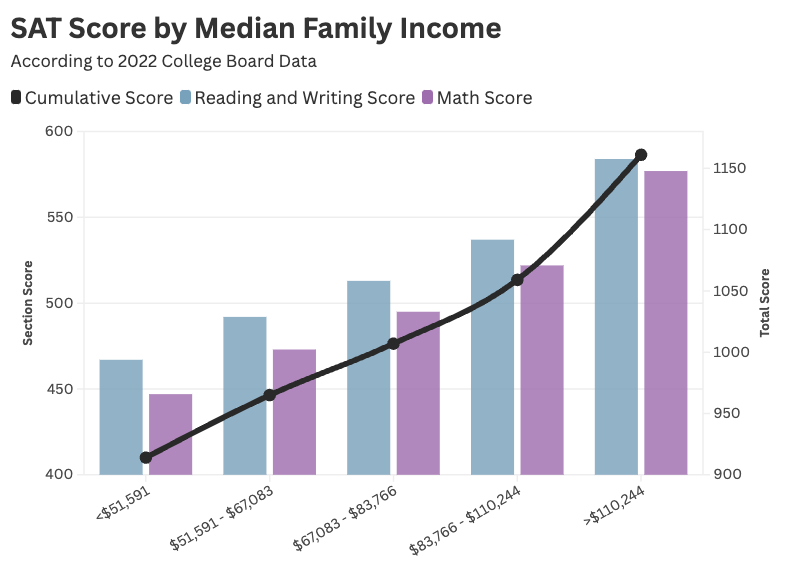In today’s rapidly changing world, the association between economic struggles and the quality of education is becoming ever more prominent, especially in the United States.
According to a New York Times article by Claire Cain Miller, those who are in the families of the top 20% earners in the United States are seven times more likely to score at least 1300 on the SAT. The gap was even bigger for the richest one percent, who are 13 times more likely.
This is a pressing issue. If it continues, it will only further widen the already broad gap in wages between higher and lower-level earners in the United States.
A large part of the reason for this great disparity is simply the amount of money that parents can invest in their children’s education. Low-income families are less likely to afford tutors or college advisors. Thus, their children may perform worse on the SAT or get rejected from higher-ranked colleges compared to children from high-income families.
The quality of education is also impacted depending on whether a student goes to an expensive, private or public school. According to Forbes “Although private school students made up only 8.5% of American students in 9-12th grades in 2019, they accounted for almost 40% of the incoming freshmen classes of 2025 at Harvard and Yale, and over 40% of the class of 2026 at Dartmouth. Again, this is largely based on the income of a student’s family, because lower income families usually don’t have the option to send their kids to private schools.
Can my financial position affect my college application?
Financial prosperity can affect a student’s application in certain cases at need-aware schools, where economic status is considered.
Adam Gimple, director of college counseling, said, “When a student is a borderline candidate at a need-aware school, they will — in certain circumstances — say, ‘If we admit this student, what is the likelihood that we are going to be able to provide them with enough financial support?’”
How does legacy affect the class-education correlation?
Family legacy often results in a continuous loop of sustaining wealth and college acceptance. According to Cornell Daily News, “Students who are children of alumni are nearly four times as likely to be admitted to elite colleges as students who have identical test scores but are not children of alumni.”
This is troubling because alumni of elite colleges are expected to earn roughly $160,000 a year by mid-career compared to the national average of roughly $60,000. This creates a double advantage for those who are born into legacy families — both resources and acceptance rate — further increasing the bias against low-income individuals and reinforcing the likelihood that children from high-income families will remain wealthy.
How will Donald Trump affect this as President?
As part of his plan for the presidency, Trump has proposed eliminating the Department of Education (DoE) entirely and redirecting funding for high-poverty schools and financial aid for college students. Eliminating the DoE would greatly impact the resources available to lower-income families and drastically change the overall landscape of what it means to be a low-income student applying for a top university.
How can the system change?
In order to shrink the educational gap between the rich and the poor, we must consider the systems that are in play, including elite universities and government administration. One solution is not only becoming test-optional, which many colleges already are, but not accepting standardized test scores at all. This would level the playing field so that upper-class students can’t get ahead in an area where they consistently outperform lower-class students. As for government administration, they must ensure that schools that rely on DoE funds are not left behind. This could be solved by preserving the DoE or at least creating another government entity to fulfill its role.






